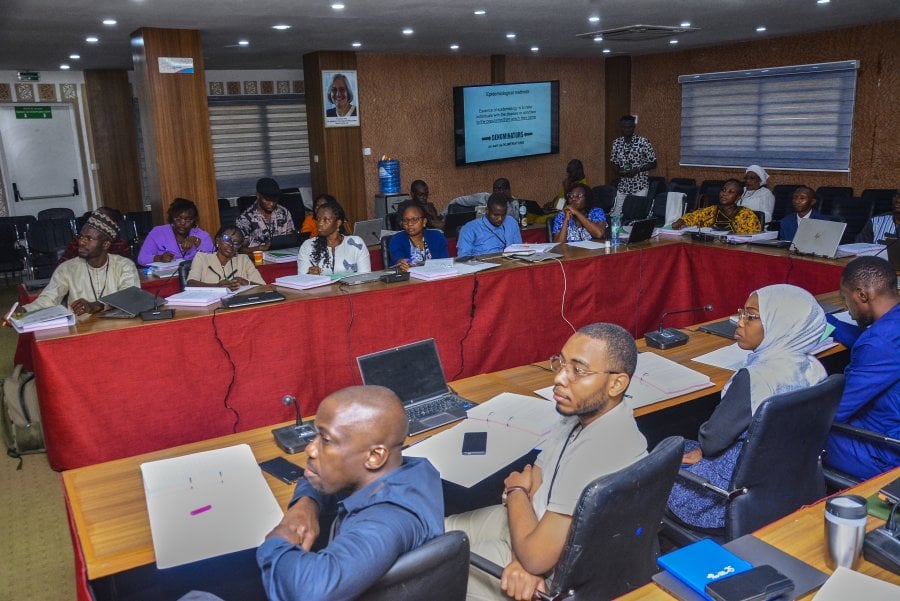
Group of individuals having a meeting in a seminar room
Organised in collaboration with the West African Research and Innovation Management Association (WARIMA) and the West African Network for Tuberculosis, AIDS and Malaria (WANETAM), the training is hosted at CIGASS, Université Cheick Anta Diop de Dakar in Senegal. Bringing together 31 participants from across West Africa with a particular focus on Francophone and Lusophone countries, the training aims to strengthen research capacity by equipping participants with essential skills in epidemiological methods and biostatistics, critical to conducting high-quality health research in the region.
Dr Nuredin Mohammed, Associate Professor of Biostatistics and Epidemiology at MRCG at LSHTM and one of the course Co-Directors, emphasised the importance of such training initiatives. “Building strong foundations in epidemiology and biostatistics is essential for developing a robust health research portfolio that addresses the pressing health challenges we face in West Africa and elsewhere. This training provides participants with methodological tools to design, analyse and interpret various studies applicable to our context,” he stated.
The sessions cover fundamental concepts including measures of effect and impact, various types of studies, as well as an in-depth exploration of errors, biases and confounding factors that can influence research outcomes. Participants are also receiving comprehensive training in statistical inference methods, building their capacity to draw valid conclusions from epidemiological data.
To build traditional epidemiological approaches with modern genomic analysis, the course also introduces participants to genetic epidemiology, an increasingly important field for understanding disease patterns and developing targeted interventions in the region. The practical components included advanced instruction in essential statistical applications such as ‘R and Stata’, providing hands-on experience on the computational tools necessary for modern research analysis to apply theoretical knowledge to real-world scenarios.
Adjiratou Aissatou Ba, a PhD student at Cheikh Anta Diop University, highlighted that the training is an opportunity to consolidate her skills in epidemiology and biostatistics, to make better use of public health data and contribute to evidence-based decision-making. “It is equipping me with the necessary skills to face up to the various epidemiological challenges affecting my country, especially with the advent of emerging diseases of virological origin, of which COVID-19 remains a perfect example,” she added.
According to Professor Alfred Amambua-Ngwa, Professor of Genetic Epidemiology and Population Genetics at MRCG at LSHTM and one of the Co-Directors of the course, the enthusiasm and engagement from participants were remarkable. “There clearly is a strong appetite for advanced training in biostatistics and genetic epidemiology methodologies across West Africa, which bodes well with needed skills for the future of research and data-informed public health policies in our region,” he said.
Speaking at the opening ceremony, Professor Safiatou Niare Doumbo, Francophone Vice President of WARIMA and one of the Course Co-Directors, highlighted that the training programme which falls under her association’s researcher development efforts, aims to promote PhD and post-doctoral capacity building in the sub-region. She expressed gratitude for the collaboration between WARIMA and MRCG at LSHTM, particularly the facilitators and other Course Co-Directors from the Unit.
The training funded by GSK represents a significant contribution to increasing the stock of specialised skills needed to support the expansion of clinical research in West Africa and beyond, ultimately enhancing the region's capacity to address its pressing public health challenges through evidence-based approaches.
If you enjoyed this article and would like to build a career in global health, we offer a range of MSc programmes covering health and data, infectious and tropical diseases, population health, and public health and policy.
Available on campus or online, including flexible study that works around your work and home life, be part of a global community at the UK's no.1 public health university.
